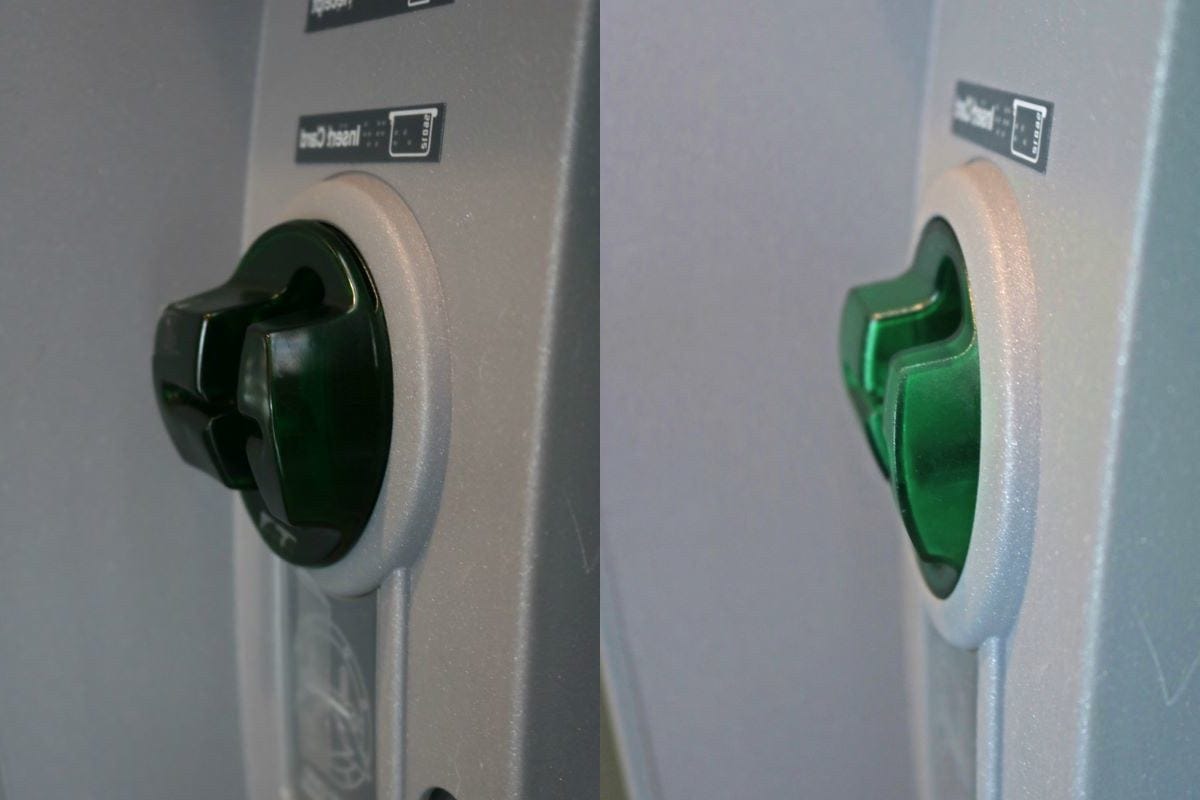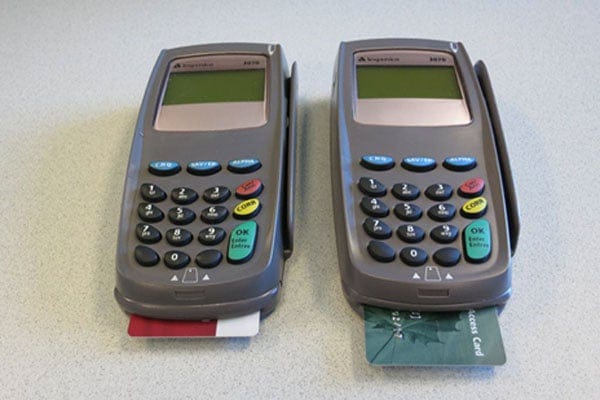1. Newsletter Update:
We currently have 399 subscribers to our newsletter; The 10th edition of our newsletter was viewed 232 times with a 35% open rate.
If you find our newsletter engaging and of value please share it with your colleagues.
Thanks for reading Security Jobs Finder Insights! Subscribe for free to receive our weekly newsletter.
2. How to spot a card-skimmer at an ATM or restaurant
Daniel Puchert 23 July 2024
South Africans should be aware of the constant threat that physical card transactions pose, including card skimming to steal bank card information.
According to the South African Banking Risk Information Centre (Sabric), victims of reported counterfeit credit card fraud lost R142 million in 2022, whereas losses from debit card fraud stood at R270 million.
Counterfeit card fraud, or card cloning, starts with stealing information from a bank card’s magnetic strip using a skimming machine.
This device can capture details, including the card number, cardholder’s name, and expiry date. This data is then used to illegally manufacture a card that can perform transactions using the genuine card’s details.
Skimming devices can also obtain the cardholder’s PIN by placing a fake keypad over the ATM’s keypad or installing a camera to record people entering their PIN.
Once an attacker has skimmed a card and stolen the information, they can use it in multiple ways.
The information can be used to make fake credit cards, sold online, or used to make fraudulent purchases online.
While this type of crime has declined in recent years, partly thanks to the rise in NFC-based contactless “tap-and-go” payments, it remains a big problem in South Africa.
Therefore, knowing how these devices are hidden to blend into an ATM remains important.
A visual and physical inspection can help to identify such devices when using an ATM.
One way to do so is to check the card reader’s alignment with the attached panel.
This can often reveal how a skimming device has been placed on top of the card reader to deceive ATM users. If it seems suspicious, compare it to a card reader at another ATM.
One example of this is a Magecart attack, where attackers will use a fake or infected website to harvest information from people’s payment cards.
The infected website is meant to resemble the target website, such as an online shop or booking platform.
Card skimming can also occur at a merchant’s point of payment using tampered devices.
Card fraud perpetrators often provide personnel working at retail outlets, such as waiters and cashiers, with handheld skimming devices.
The PIN is either stolen by peaking or using thermal technology when the victim enters it.
Regarding this type of skimming, the advice is that if you cannot insert your chip card and have your thumb remain fully on the card, do not enter your PIN.
SABRIC tips to prevent your card from being skimmed Follow the instructions on the ATM screen carefully. Be alert to your surroundings. Do not use the ATM if loiterers or suspicious people are nearby. Be aware that fraudsters are often well-dressed, well-spoken and respectable-looking individuals. If you are disturbed while transacting at the ATM, your card may be skimmed by being removed and placed back into the ATM without your knowledge.
Cancel the transaction immediately and report the incident using your Bank’s Stop Card Toll-Free number, which is displayed on all ATMs and on the back of your bank card. This can also be done on your mobile banking app.
After successfully transacting at the ATM, leave immediately.
Be cautious of strangers who ask you to return to the ATM to finalise a transaction, as skimming may occur during this request.
Never force your card into the slot if you experience initial difficulty, as it might have been tampered with. If your card is swallowed by an ATM, do not leave the ATM until you have cancelled it. Know what your ATM looks like so that you can identify any foreign objects attached to it. Do not ask anyone to assist you at the ATM, not even the security personnel guarding the ATM or a bank official.
Go into the bank for assistance.
Do not insert your card if the screen layout is unfamiliar. Whether you are at a restaurant, retail store, filling station or tollgate, ensure that you never lose sight of your card. Check your balance regularly and report discrepancies to your bank immediately.
Source: https://mybroadband.co.za/news/security/545421-how-to-spot-a-card-skimmer-at-an-atm-or-restaurant.html?utm_source=newsletter
3.Weekly Poll
Last week’s poll results
Last week we asked: Have you experienced an Armed Robbery at Work?
Responses: We had 8 responses on last week’s poll:
50% of respondents voted No
50% of respondents voted Yes
4. Interview Q & A
This week’s topic will address the question of: What is Hygiene
What is hygiene?
Hygiene refers to the practices and conditions that promote health and cleanliness. Maintaining good hygiene is essential for ensuring a safe and healthy environment for both employees and clients.
Introduction
Personal hygiene is a fundamental aspect of professionalism in any field, but it holds particular importance for security officers. As frontline representatives of safety and order, security personnel are often the first point of contact for clients, visitors, and the general public.
The Importance of Personal Hygiene in Security
1. Professional Image: A well-groomed security officer projects confidence, competence, and attention to detail. This positive image extends to the entire security team and the organisation they represent.
2. Client Trust: Clean and presentable security officers inspire trust and respect from clients and the public, enhancing the overall effectiveness of security operations.
3. Health and Safety: Good hygiene practices reduce the risk of illness transmission, protecting both the officer and those they interact with during their duties.
4. Alertness and Performance: Proper hygiene habits contribute to an officer's overall well-being, potentially improving alertness and job performance.
5. Compliance: Many security companies and client organisations have specific grooming and hygiene standards that officers must meet as part of their employment requirements.
Essential Hygiene Practices for Security Officers
1. Personal Cleanliness
- Daily Bathing: Shower or bathe daily, using soap to remove dirt, sweat, and odor-causing bacteria.
- Oral Hygiene: Brush teeth at least twice daily and use mouthwash to maintain fresh breath.
- Hand Washing: Wash hands frequently, especially after using the restroom, before eating, and after handling potentially contaminated objects.
2. Grooming
- Hair Care: Keep hair clean, neat, and styled according to company guidelines. This includes facial hair, which should be well-trimmed or clean-shaven as per policy.
- Nail Care: Keep fingernails clean and trimmed to a professional length.
- Skincare: Maintain clear, healthy skin through proper cleansing and moisturising routines.
3. Uniform and Clothing
- Clean Uniforms: Wear a fresh, clean uniform for each shift. Launder uniforms regularly to prevent odor buildup.
- Proper Fit: Ensure uniforms fit well and are free from wrinkles, tears, or stains.
- Footwear: Keep shoes clean and polished. Ensure they are comfortable and appropriate for long periods of standing or walking.
4. Odor Control
- Deodorant: Use an effective antiperspirant or deodorant daily.
- Avoid Strong Scents: Refrain from using heavily scented products that may be offensive or distracting to others.
- Fresh Breath: Use breath mints or sugar-free gum if needed, especially after meals.
5. Health Maintenance
- Regular Exercise: Engage in physical activity to promote overall health and manage stress.
- Adequate Sleep: Ensure sufficient rest to maintain alertness and a healthy appearance.
- Healthy Diet: Consume a balanced diet to support overall health and well-being.
Implementing Hygiene Standards in Security Teams
1. Clear Policies: Establish and communicate clear hygiene and grooming standards as part of the company policy.
2. Training: Provide regular training sessions on the importance of personal hygiene and its impact on professional performance.
3. Lead by Example: Supervisors and managers should exemplify high standards of personal hygiene.
4. Regular Inspections: Conduct routine uniform and grooming inspections to ensure compliance with standards.
5. Feedback Mechanism: Implement a system for addressing hygiene concerns discreetly and professionally.
Finally,
Personal hygiene is not just about appearance; it's an integral part of a security officer's professional toolkit. By maintaining high standards of cleanliness and presentation, security personnel enhance their effectiveness, build trust with clients and the public, and contribute to a healthier, more professional work environment. As the face of security operations, officers who prioritise personal hygiene demonstrate their commitment to excellence in all aspects of their duties.
5. The different career options available in the security field
This week we discuss the role of an Admin Manager
Introduction
In the security industry, the role of an Administrative (Admin) Manager is pivotal in ensuring smooth operations and efficient management of resources. The Admin Manager oversees administrative tasks, supports the security team, and contributes to the overall effectiveness of the organisation.
The Role of an Admin Manager in the Security Industry
An Admin Manager is responsible for managing administrative functions, coordinating with various departments, and ensuring compliance with organisational policies. They act as a bridge between the security team and other administrative functions, facilitating communication and efficient workflow.
Key Duties and Responsibilities of an Admin Manager
Administrative Oversight
- Office Management: Overseeing the day-to-day operations of the office, ensuring that it runs smoothly and efficiently. This includes managing office supplies, equipment, and facilities.
- Scheduling and Coordination: Managing schedules for security personnel, including shifts, training sessions, and meetings. Ensuring that there is adequate coverage and that staff are informed of their duties.
Financial Management
- Budgeting: Assisting in the preparation and management of the security department's budget. Monitoring expenses and ensuring that spending aligns with the allocated budget.
- Payroll: Overseeing payroll processes for security staff, ensuring accurate and timely payment. Handling any payroll-related issues and coordinating with the payroll department.
Compliance and Reporting
- Regulatory Compliance: Ensuring that the security team complies with all relevant laws, regulations, and industry standards. Keeping abreast of changes in legislation and updating policies accordingly.
- Reporting: Preparing and submitting regular reports on security operations, incidents, and administrative activities. These reports are used for management review and decision-making.
Human Resources Support
- Recruitment and Onboarding: Assisting in the recruitment process for security personnel, including screening candidates, conducting interviews, and facilitating onboarding.
- Training and Development: Coordinating training programs for security staff, ensuring they receive necessary certifications and ongoing professional development.
Communication and Coordination
- Internal Communication: Facilitating effective communication within the security team and between departments. Ensuring that important information is disseminated promptly and accurately.
- Client Relations: Acting as a point of contact for clients, addressing their concerns and ensuring their needs are met. Coordinating with the security team to provide excellent service.
Technology and Systems Management
- Systems Oversight: Managing administrative systems and software used by the security team. Ensuring that these systems are up-to-date and functioning correctly.
- Data Management: Maintaining accurate records of security operations, personnel files, and administrative activities. Ensuring data is securely stored and easily accessible.
Importance of an Admin Manager in the Security Industry
1. Operational Efficiency
- An Admin Manager ensures that all administrative processes run smoothly, allowing security personnel to focus on their core responsibilities. This enhances overall operational efficiency.
2. Compliance and Accountability
- By ensuring compliance with regulations and maintaining accurate records, the Admin Manager helps the organisation avoid legal issues and demonstrates accountability.
3. Resource Management
- Effective management of resources, including budgeting and payroll, ensures that the security department operates within its means and maximises the use of available resources.
4. Employee Support and Development
- Supporting the recruitment, onboarding, and training of security personnel helps build a skilled and motivated team, contributing to the overall effectiveness of security operations.
5. Client Satisfaction
- By maintaining excellent communication and addressing client concerns, the Admin Manager plays a key role in ensuring client satisfaction and retention.
How to Become an Admin Manager in the Security Industry
1. Education
- A degree in business administration, management, or a related field is often required. Some positions may require additional qualifications in security management or related disciplines.
2. Experience
- Prior experience in administrative roles, preferably within the security industry, is essential. Experience in managing budgets, schedules, and compliance is highly valued.
3. Skills Development
- Developing strong organisational, communication, and leadership skills is crucial. Proficiency in administrative software and systems is also important.
4. Certification
- Obtaining certifications in security management or related areas can enhance career prospects and demonstrate expertise.
Career Opportunities and Advancement
1. Senior Administrative Roles
- With experience, Admin Managers can advance to senior administrative roles within the organisation, taking on greater responsibilities and overseeing larger teams.
2. Operations Management
- Some Admin Managers transition into operations management, where they oversee broader aspects of security operations and strategic planning.
3. Consultancy
- Experienced Admin Managers may also pursue consultancy roles, providing expertise and advice to other organisations in the security industry.
Conclusion
The role of an Admin Manager is integral to the efficient and effective functioning of security operations. By managing administrative tasks, ensuring compliance, supporting staff, and maintaining client relations, the Admin Manager contributes significantly to the overall success of the organisation. For those with strong organisational and communication skills, a career as an Admin Manager in the security industry offers a rewarding and impactful opportunity.
6. How to Use Security Jobs Finder Website to get Employed
This week we discuss using Meta AI to help you complete the About Me and Work History Sections on your online cv at Security Jobs Finder
HOW TO USE META AI ON WHATSAPP: A QUICK GUIDE
META AI IN WHATSAPP: YOUR HANDY AI ASSISTANT
Using Meta AI in WhatsApp to Complete Your CV on Security Jobs Finder
Meta AI, a new feature in WhatsApp, is revolutionising how we interact with messaging apps. This AI-powered assistant can answer questions, help with tasks, and even generate images, all within the familiar WhatsApp interface. While it's still being rolled out gradually, Meta AI has the potential to become a valuable tool for various tasks, including job searching and CV writing.
For security professionals looking to enhance their job search, Meta AI in WhatsApp could be a game-changer. By leveraging its capabilities, you can get assistance in crafting your CV for the Security Jobs Finder website, making the process more efficient and potentially improving the quality of your application.
Quick Guide: Using Meta AI for Your CV
Accessing Meta AI in WhatsApp:
1. Ensure you have the latest version of WhatsApp installed.
2. Look for the Meta AI icon:
- Android: Bottom right corner of the WhatsApp screen
- iPhone: Top right corner, next to the camera button
- WhatsApp Web/Desktop: Left-hand side of the screen
3. Tap or click the icon to start chatting with Meta AI.
Completing Your "About Me" Section:
1. Start a chat with Meta AI and type: "@Meta AI Help me write an 'About Me' section for my security professional CV." Repeat this step for each separate section, just changing the “section” each time.
2. Provide Meta AI with key information about your experience, skills, and career goals in the security field.
3. Ask Meta AI to refine and polish the text, ensuring it highlights your unique value proposition.
Crafting Your Job History:
1. For each previous job, ask Meta AI: "@Meta AI Help me describe my role as [Job Title] at [Company Name]."
2. Provide details about your responsibilities, achievements, and the duration of your employment.
3. Request Meta AI to format the job descriptions consistently and highlight key accomplishments relevant to security roles.
Remember to review and personalise all AI-generated content. While Meta AI can provide a solid starting point, your unique voice and experiences should shine through in the final CV.
Important Considerations
- Privacy: Be cautious about sharing sensitive personal information with Meta AI.
- Accuracy: Double-check all information generated by Meta AI for accuracy and relevance.
- Personalisation: Use Meta AI as a tool to enhance your CV, not replace your personal touch.
By leveraging Meta AI in WhatsApp, you can streamline the process of creating a compelling CV for the Security Jobs Finder website, potentially giving you an edge in your job search within the security industry.
Thats it for this week’s edition. I hope that you found it informative. Make sure to like and subscribe and follow our socials for jobs etc.
Please leave a comment in the comments section. It helps me with ideas of articles to add into the newsletter each week.
If you have an idea for an article leave it in the comments section.









